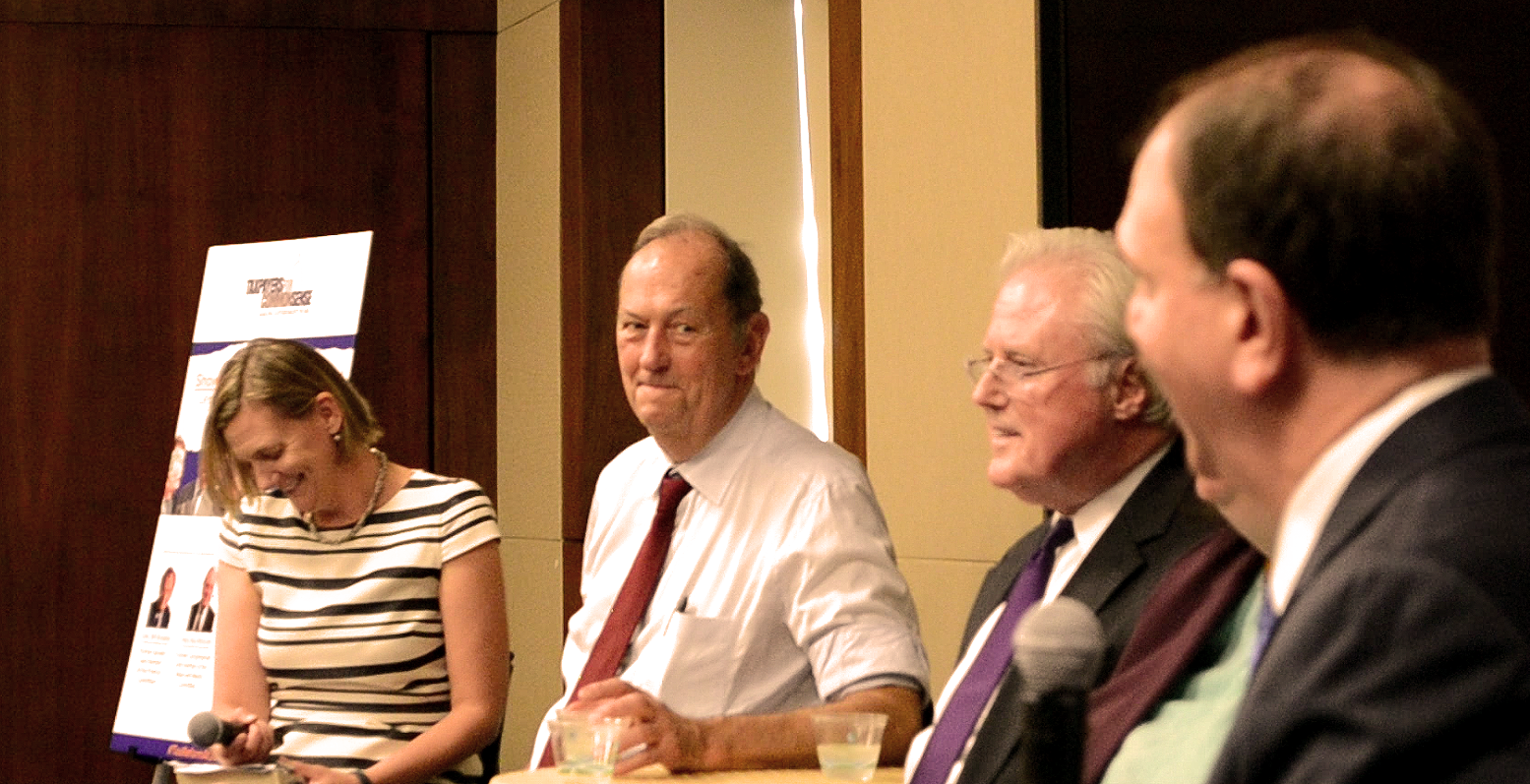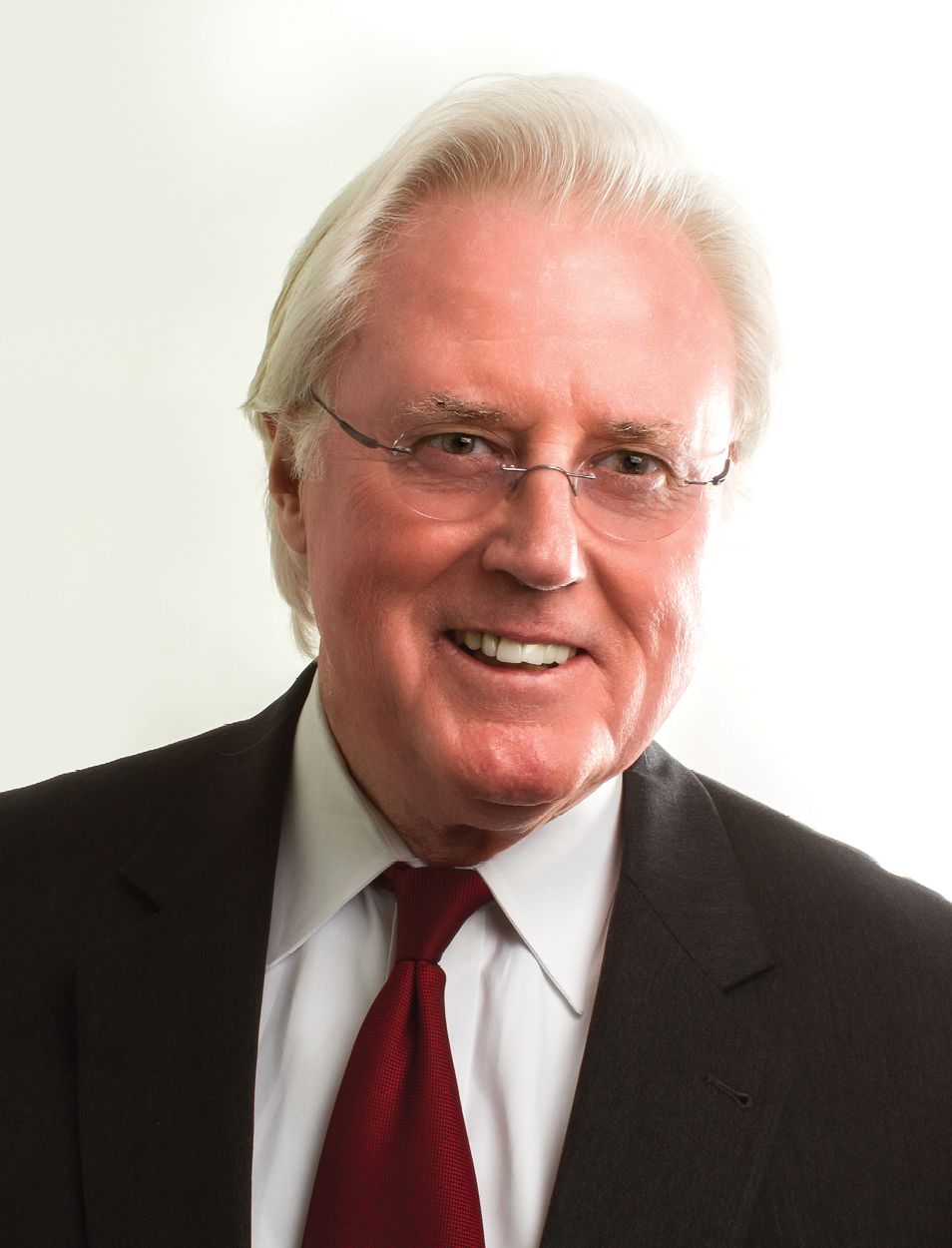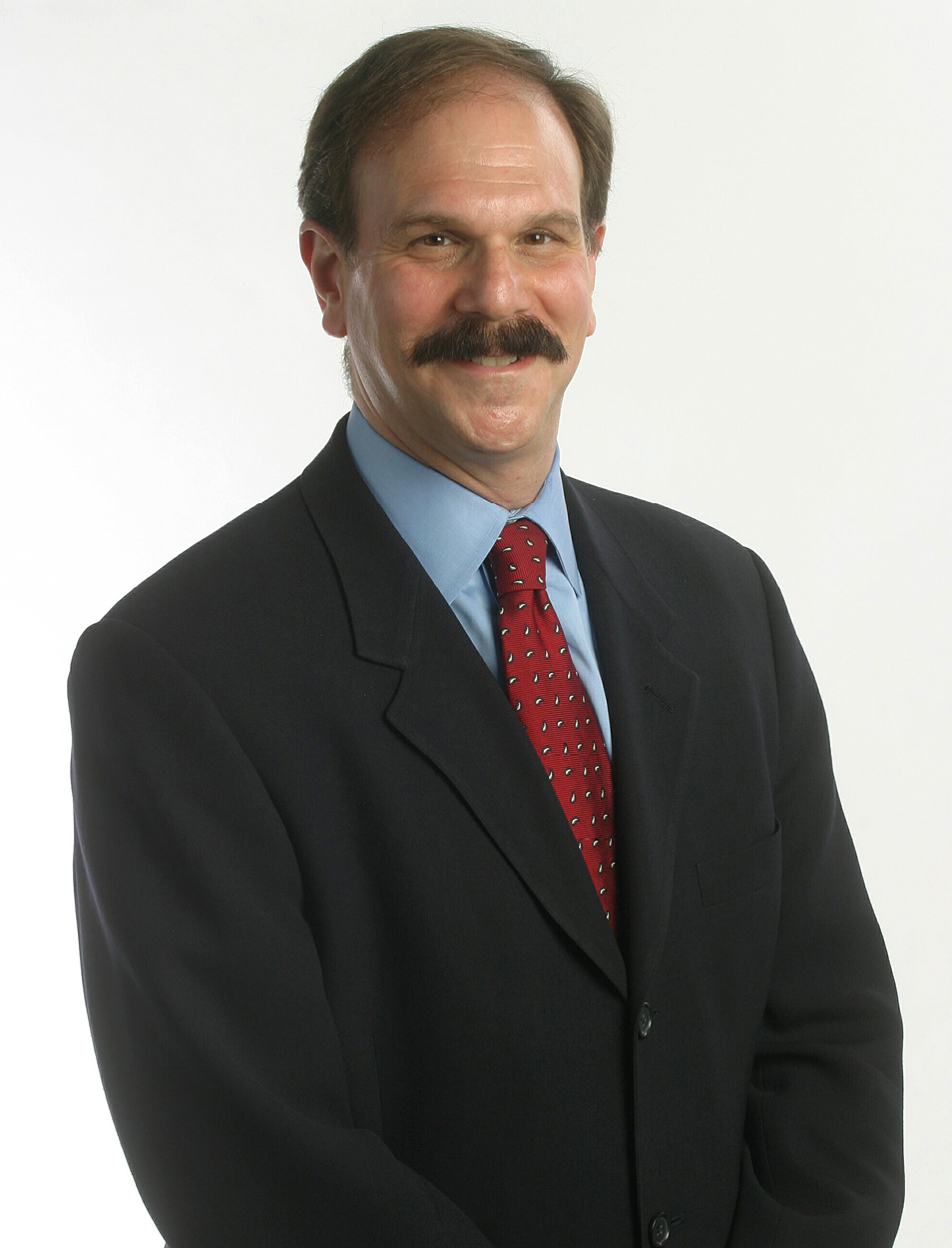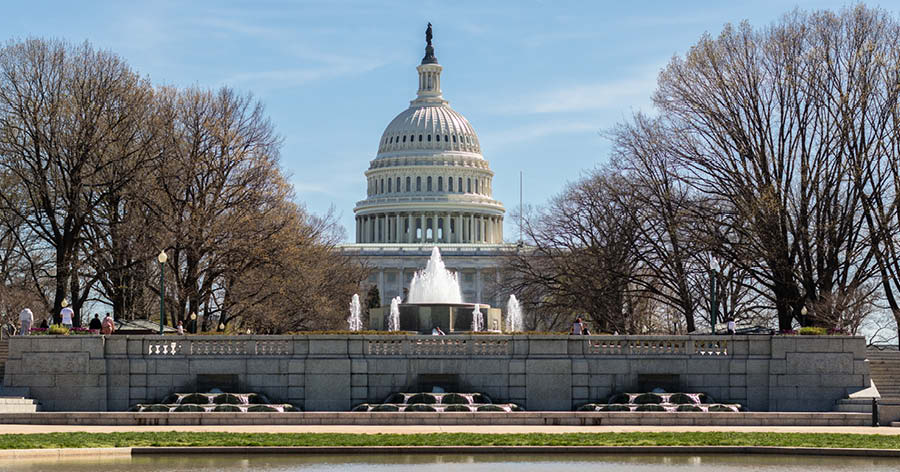Event
Showdown at Gucci Gulch Revisited: Lessons Learned from 1986 Tax Reform
On September 22, 2016, Taxpayers for Common Sense held a panel conversation commemorating the Tax Reform Act of 1986. The message was crystal clear:
The only path to major tax reform involves hard work by members of Congress willing to immerse themselves in substance and open their ears to the concerns of their colleagues on the other side of the aisle. In today’s political climate, that may seem like a pipedream, but that is precisely why we assembled the panel: To talk about what it takes to make change.
The panelists included former Senator Bill Bradley (D-NJ), who was a member of the Finance Committee and a major player in the 1986 passage; former Rep. McGrath (R-NY), who was a key member of the Ways and Means Committee; Janice Mays, who worked on the tax reform effort as a Ways and Means staff member and recently retired as the panel’s chief counsel and staff director; and Jeffrey H. Birnbaum, who covered the tax reform debate as a reporter for The Wall Street Journal and co-authored with Alan Murray the definitive book on the subject: Showdown at Gucci Gulch: Lawmakers, Lobbyists, and the Unlikely Triumph of Tax Reform.
 |
| From left: Ryan Alexander, Sen. Bill Bradley, Rep. Ray McGrath, and Jeff Birnbaum |
Each of the panelists focused on the need for bipartisanship if Congress is ever to replicate the success of 1986.
A “sense of bipartisanship is absolutely critical’’ to reform, Bradley declared. He said lawmakers, special interest groups, and the public need “to listen to each other’’ and not just press for their parochial needs.
Bradley laid out a prescription for success:
- A president committed to reform;
- A savvy Treasury Secretary who knows the subject well, can make deals, and is likewise committed to reform;
- Willing chairs of the House Ways and Means and Senate Finance committees who see success is in their political interest;
- Zealots that press for reform at every opportunity.
In 1986, “I was that zealot,’’ the former senator said.
Read our full recap of the Sept. 22 event here.
About the Tax Reform Act of 1986
Thirty years ago, President Ronald Reagan led the bi-partisan effort to overhaul the federal tax code. While Ways and Means and Finance Committee Chairmen Dan Rostenkowski (D-IL) and Bob Packwood (R-OR) ushered the bill over the goal line, there were many others who had earlier proposed reforms that laid the groundwork such as Sen. Bill Bradley (D-NJ) and Rep. Richard Gephardt (D-MO) and Sen. Bob Kasten (R-WI) and Rep. Jack Kemp (R-NY). This bipartisan swirl of ideas is embodied in the final product.
The Tax Reform Act of 1986 simplified the income tax code, broadened the tax base, and eliminated many tax shelters. In a demonstration of bipartisanship hard to find today, President Reagan and a Republican-controlled Senate cooperated with a Democratic-controlled House to tackle comprehensive tax reform. Since then Congress has enacted a myriad of piecemeal provisions that create economic inefficiencies and market distortions, cost more to administer, and make it harder for Americans to comply.
To mark the thirtieth anniversary of the last comprehensive tax reform, Taxpayers for Common Sense hosted an event with some of the people deeply involved in that process. Sen. Bradley was an early proponent of reform. Rep. Ray McGrath (R-NY) was integral to the House negotiations. Janice Mays was a committee staffer involved in the effort. And Jeff Birnbaum was there to help chronicle the tale in the seminal book on tax reform: Showdown at Gucci Gulch. The goal of this panel is to identify some of the lessons from thirty years ago that could inform today’s efforts to achieve some of the same reforms: lower rates and fewer loopholes.
Tax policy, like federal spending, must help maximize economic growth and the benefits it provides. It also needs to generate the revenue necessary to fund the government that the people and their elected officials put into place. In the pursuit of comprehensive tax reform, Congress needs to evaluate each provision. Adopting a “blank slate” approach whereby every tax break is eliminated and added back into the code only if it can be justified is the correct approach. Every provision whether for generating revenue or tax expenditure should be judged by a set of criteria including its economic efficiency, equity, simplicity, transparency, and administrability.
Panelists
Former Senator Bill Bradley (D-NJ)
Senator William W. Bradley, 72, is a Managing Director of Allen & Company LLC. From 2001-2004, he acted as chief outside advisor to McKinsey & Company’s nonprofit practice. He was a Senior Advisor and Vice Chairman of the International Council of JP Morgan & Co., Inc. from 1997-1999. During that time, he also worked as an essayist for CBS evening news and was a visiting professor at Stanford University, University of Notre Dame and the University of Maryland.
Senator Bradley served in the U.S. Senate from 1979 – 1997 representing the state of New Jersey. In 2000, he was a candidate for the Democratic nomination for President of the United States. Prior to serving in the Senate, he was an Olympic gold medalist in 1964 and a professional basketball player with the New York Knicks from 1967 – 1977 during which time they won 2 NBA championships. In 1982, he was elected to the Basketball Hall of Fame. Senator Bradley holds a BA degree in American History from Princeton University and an MA degree from Oxford University where he was a Rhodes Scholar.
He has authored seven books on American politics, culture and economy, including his latest book We Can All Do Better. Currently, Senator Bradley hosts American Voices, a weekly show on Sirius XM Satellite Radio that highlights the remarkable accomplishments of Americans both famous and unknown.
Former Representative Ray McGrath (R-NY)
Ray McGrath, a highly respected Capitol Hill veteran, leads the charge for the interests of his clients. Ray, a former Republican Member of the House of Representatives from New York, served 12 years in the House with eight of those on the powerful Ways and Means Committee. After retiring from Congress, Ray served as president of a large trade association and eventually joined the bipartisan government relations firm, Downey McGrath Group.
Originally from Valley Stream, NY, Ray graduated from the University of New York at Brockport and received an M.A. from New York University. Ray’s decades of public service experience, beginning with his distinguished career in the New York State Assembly, his experience in a variety of top positions and strong relationships with policy makers on both sides of the aisle make his expertise unparalleled in Washington.
As President of the National Republican Club of Capitol Hill (the Capitol Hill Club) for over 20 years, Ray has built and maintained relationships with Washington’s top lawmakers and leaders. His years of experience give Ray a special kinship with the leadership in both houses of Congress.
Janice Mays
Janice has had a 40-year career on the Hill including over 22 years as the Democratic chief counsel and staff director for the House Ways and Means Committee. In that role, she was responsible for all tax and economic policy initiatives and statements from the Ways and Means Democrats during that time. Janice began her service with the Committee in 1975 as Tax Counsel. From the onset of her Capitol Hill career, she was the first woman to serve in each role she undertook. When she was named Chief Counsel in 1993, she was the first woman named to lead the staff of any major committee in the House.
Janice served five Democratic Chairmen/Ranking Members on the Committee in the House that is charged under the Constitution with originating all revenue legislation. During her tenure, she was closely involved with and responsible for tax legislation, including the Tax Reform Act of 1986.
Jeffrey Birnbaum
Jeffrey H. Birnbaum is president of BGR Public Relations. He leads a team in Washington and London that gives strategic advice to coalitions, companies and governments about handling media and issue campaigns. As an award-winning journalist, Jeff worked for the premier news outlets in the United States.
His experience includes serving as a White House, congressional and tax reporter for the Wall Street Journal, a senior political correspondent for Time Magazine, Washington bureau chief for Fortune Magazine and a columnist for the Washington Post. He is also the author of four books about Washington, including the award-winning “Showdown at Gucci Gulch,” which he wrote with Alan S. Murray. In 1994, he won the Aldo Beckman Memorial Award for his coverage of the White House.
Resources
TCS Comments on Tax Reform to Senate Finance Committee
It has been more than a quarter-century since the last overhaul of the tax code, and in that time it has become a confusing thicket littered with narrow carve-outs, parochial preferences, and revenue giveaways.
Letter to Chairman of Senate Finance Committee Re: Tax Reform Discussion Drafts
Today TCS sent a letter to the Chairman of the Senate Finance Committee Regarding Tax Reform Discussion Drafts

.jpg)

















Get Social